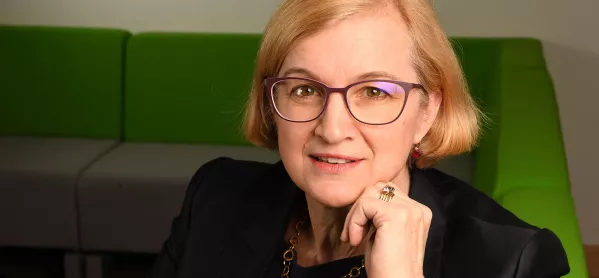Ofsted knows its complaints process is “not satisfying” schools and it is reviewing how it can address concerns about disputed grades, chief inspector Amanda Spielman told headteachers today.
She also acknowledged that there have been school inspections in which pupils’ voice had been weighted “a bit heavier” than it should have been.
Ms Spielman took part in a question-and-answer session at the Association of School and College Leaders’ annual conference today, hosted by the union’s past president and headteacher Pepe Di’lasio.
Ms Spielman was asked about the fact that most complaints to the inspectorate are not upheld.
Earlier this year Ofsted said that it was reviewing its complaints process after concerns were raised by school leaders.
Concerns over Ofsted’s complaints process
At today’s question-and-answer event, Mr Di’lasio said: “My favourite drama show in the last two years is Line of Duty. And there’s a famous character, Superintendent Ted Hastings, who investigates complaints with the police and he investigates famously without ‘fear or favour’.
“What do you think Ted Hastings might say of the complaints process within Ofsted, and the fact that so few are upheld.”
Ms Spielman responded: “I think it’s really important to recognise that most of our work to get things right happens very early on in inspection.
“Within the inspection there is a lot of discussion. We do everything we can to make space - if a school thinks that the outcome is not heading in the direction it believes is right, there’s a lot of discussion.
“Then there are opportunities for more senior inspectors to become involved. We do sometimes declare inspections incomplete and gather additional evidence.”
However, she added of the complaints policy: “But we know that it’s not a satisfying process. It’s not something we’re happy with or complacent about because we know that for all the immense amount of work put in and the conscientiousness with which we do it, it still doesn’t lead to satisfaction at the end of the day.”
She added that this was “why we’re doing another round of work to try and find a different way of approaching it to address what’s nearly always the root of the problem, which is the grade isn’t accepted, and to try and find ways to address that more directly earlier on”.
In January this year the ASCL warned that an Ofsted shake-up of its complaints policy looking at faster referrals of cases to senior bosses would not go far enough to restore “waning confidence” in the inspectorate.
Ofsted reviewing its approach to safeguarding
During the session, Ms Spielman was also asked about school leaders’ concerns that pupil voice was sometimes used “disproportionately” in inspection findings.
She said she had heard about a couple of cases where the voice of pupils in reports had been “perhaps a bit heavier than it should have been”.
Ms Spielman added: “It’s something that we’ve been addressing, and through inspector training: seeing-the-bigger-picture inspector training, and we are taking a look as well at some of the safeguarding and elements of the handbook and training.
“It’s very definitely something that we understand needs to be right.”
Spielman’s advice to next chief inspector
Mr Di’lasio also asked Ms Spielman what advice she would give to her successor, as her extended term as chief inspector is due to end in 2023.
She replied: “I would say, ‘Keep with the principles of substance and integrity.’ I think these principles are really important.”
This was in reference to the focus of the Education Inspection Framework, introduced in 2019, which places increased emphasis on the curriculum, and which Ms Spielman has said aims to get to the “substance of education”.
She also told heads that her advice would be that you can never communicate too much, and to value people in the organisation and in the wider sector.




